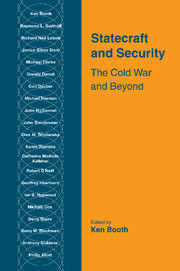Book contents
- Frontmatter
- Contents
- List of contributors
- Preface
- Introduction
- Part one Cold War: lessons and legacies
- Part two Post-Cold War: powers and policies
- 5 Can the United States lead the world?
- 6 Can Russia escape its past?
- 7 Imperialism, dependency and autocolonialism in the Eurasian space
- 8 Western Europe: challenges of the post-Cold War era
- 9 Europe and the wider world: the security challenge
- 10 A new Japan? A new history?
- 11 New China: new Cold War?
- 12 Africa: crisis and challenge
- 13 Of medium powers and middling roles
- Part three Beyond: resistances and reinventions
- Conclusion: security within global transformation?
- Index
7 - Imperialism, dependency and autocolonialism in the Eurasian space
Published online by Cambridge University Press: 06 October 2009
- Frontmatter
- Contents
- List of contributors
- Preface
- Introduction
- Part one Cold War: lessons and legacies
- Part two Post-Cold War: powers and policies
- 5 Can the United States lead the world?
- 6 Can Russia escape its past?
- 7 Imperialism, dependency and autocolonialism in the Eurasian space
- 8 Western Europe: challenges of the post-Cold War era
- 9 Europe and the wider world: the security challenge
- 10 A new Japan? A new history?
- 11 New China: new Cold War?
- 12 Africa: crisis and challenge
- 13 Of medium powers and middling roles
- Part three Beyond: resistances and reinventions
- Conclusion: security within global transformation?
- Index
Summary
The contemporary debate about the future of politics in the Eurasian space comes back again and again to ‘the Russian question’: will the Soviet Union, having collapsed, reassert itself, this time as a new Russian empire? Some analysts in the West and elsewhere moved quickly from euphoria over these long-suppressed nations gaining independence to concern over whether they would be able to resist or survive in the face of any renewed Russian imperial drive. Books and articles started to fill the shelves analysing Russia's potential strength, assessing the foreign policy impact of its domestic political divisions, speaking of the Russian impulse to empire, and chronicling the near-total obsession which elites in neighbouring countries have with managing the relationship with Moscow (Reddaway, 1993a, 1993b; Hill and jewett, 1994; Pipes, 1994).
Many of the authors point to the difficulties faced by elites in all the new states, including Russia, in developing a conception of national interest which would orient their foreign policies beyond the Eurasian heartland (Dawisha and Parrott, 1994: ch. 6). But the frailties both of the new states themselves and of the institutions for formulating foreign policy within them limit their ability to extend the focus of their external politics outside the Eurasian orbit. The fact that the inter-relationships amongst these fifteen states are likely, for the foreseeable future, to occupy the first rank of their concerns means that the international system will also interact with them through the prism of these relationships.
- Type
- Chapter
- Information
- Statecraft and SecurityThe Cold War and Beyond, pp. 164 - 178Publisher: Cambridge University PressPrint publication year: 1998



